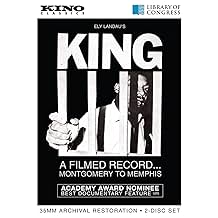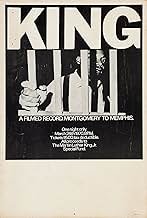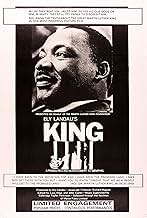Añade un argumento en tu idiomaFollows Martin Luther King's life and decades-long civil rights activism.Follows Martin Luther King's life and decades-long civil rights activism.Follows Martin Luther King's life and decades-long civil rights activism.
- Dirección
- Guión
- Reparto principal
- Nominado para 1 premio Óscar
- 1 premio y 1 nominación en total
Martin Luther King
- Self
- (metraje de archivo)
Ralph Abernathy
- Self
- (metraje de archivo)
James Baldwin
- Self
- (metraje de archivo)
Tony Bennett
- Self
- (metraje de archivo)
Leonard Bernstein
- Self
- (metraje de archivo)
Marlon Brando
- Self
- (metraje de archivo)
H. Rap Brown
- Self
- (metraje de archivo)
Reseñas destacadas
10greg-253
After watching 103 minute edited version (the only celeb commentary by Harry Belefonte), one has to wonder why this film isn't more available to the general public. It is by far, one of the best documentary efforts to chronicle Martin Luther King Jr. as he helped push the civil rights movement forward into the public consciousness.
What makes this film special (in its condensed version) is the plainly laid out - but thoughtfully edited - chronology of Dr. King's various actions, speeches - and the public response. Other than Belafonte's opening statement, the film has no narration - which gives it an urgency. This is punctuated by King's powerful oratory (including the entire I Have A Dream speech...and segments of many others), along with footage of demonstrations, marches and material that is often hard to watch due to the racially charged violence.
Still, it is a potent reminder of our history - and should be seen by all.
What makes this film special (in its condensed version) is the plainly laid out - but thoughtfully edited - chronology of Dr. King's various actions, speeches - and the public response. Other than Belafonte's opening statement, the film has no narration - which gives it an urgency. This is punctuated by King's powerful oratory (including the entire I Have A Dream speech...and segments of many others), along with footage of demonstrations, marches and material that is often hard to watch due to the racially charged violence.
Still, it is a potent reminder of our history - and should be seen by all.
We just passed what would've been Martin Luther King, Jr.'s 90th birthday, so I decided to watch this documentary. You've heard about Martin Luther King, Jr. You've probably seen footage of some of his speeches. But to truly understand him, you have to see Sidney Lumet's Academy Award-nominated "King: A Filmed Record... Montgomery to Memphis". Originally screened as a one-night event, it's now available for home viewing. The documentary consists of footage of King starting with the bus boycott in Montgomery until his funeral, emphasizing how he called upon the United States to live up to the ideals that it professed. Whether addressing racial and class issues or coming out against the Vietnam War, he was on the front lines of justice every step of the way.
The documentary includes footage of people (Harry Belafonte, Ruby Dee, Paul Newman, Joanne Woodward, etc) quoting King. It emphasizes the diversity of people who stood on the side of morality. In an era when we see racism coming back to the fore - pushed by the current demagogue-in-chief - it's more important than ever to understand King's legacy. Definitely see this documentary.
The documentary includes footage of people (Harry Belafonte, Ruby Dee, Paul Newman, Joanne Woodward, etc) quoting King. It emphasizes the diversity of people who stood on the side of morality. In an era when we see racism coming back to the fore - pushed by the current demagogue-in-chief - it's more important than ever to understand King's legacy. Definitely see this documentary.
I'm not sure this is an actual documentary. It has no editorial or narrative structure per se, what it presents us with is as comprehensive a chronology of Dr. Martin Luther King as it is possible to get. From his humble beginnings in an Alabama ridden with bigotry and strife, through to his assassination in 1968, this uses a phenomenal amount of archive research to illustrate the power of his oratory. His speeches are powerful and emotional, but they never come across as angry or provocative of violence. His strength of character and purpose in the face of a long-established racial belligerence is really quite well captured as the film includes the large scale "I Have a Dream" set-pieces to far more intimate and poignant comments to smaller groups, churches or even just to his aides and friends as he travels the length and breadth of the country extolling the virtues of freedom for all. That all isn't just for folks of colour, but those being persecuted for their religious beliefs too, or being disadvantaged because of their sex or social status. It's hard to imagine who might actually watch all of this now, it is a long haul, but it goes quite some way to testifying just how effective oratory can be when delivered confidently and proudly to an audience eager to engage. There is enough annotation to help advise on the locations and timelines, and there are a few - slightly unnecessary, I felt - staged readings from the likes of Charlton Heston and James Earl Jones to help, as does the latter archive footage, demonstrate that his optimism wasn't just inspiring those African Americans, but plenty from the descendants of it's European immigrant population too. It doesn't attempt to analyse the man, his motives or his personal life but I don't think that was anyone's plan. It's a vehicle for his passion, and it works powerfully.
It's a documentary of Martin Luther King, Jr.'s life from 1955 to his death in 1968. Except for his first speech at the beginning of the Montgomery Bus Boycott, it is primarily news footage and coverage of his best-known activities during those years and the local circumstances that brought about those activities. The Montgomery speech is audio only. That is both its strength and limitation.
This film is one of the few places you can still see and hear the entirety of King's "I Have a Dream" speech of 1963. There are numerous other memorable speeches; seeing him deliver them visually dramatically increases the impact. It is so focused on King, however, that you don't get an overview of the Civil Rights movement, especially those parts in which he had a limited profile, such as the Freedom Rides in 1961.
There is nothing about King's personal life or the work of his associates. To get better context, you need the background of a good biography like Jonathan Eig's "King: a Life." But to be bathed in M. L. King's oratory, this three-hour film is the place to go.
Some celebrities narrate brief segments intermittently. They are a distraction and add nothing.
This film is one of the few places you can still see and hear the entirety of King's "I Have a Dream" speech of 1963. There are numerous other memorable speeches; seeing him deliver them visually dramatically increases the impact. It is so focused on King, however, that you don't get an overview of the Civil Rights movement, especially those parts in which he had a limited profile, such as the Freedom Rides in 1961.
There is nothing about King's personal life or the work of his associates. To get better context, you need the background of a good biography like Jonathan Eig's "King: a Life." But to be bathed in M. L. King's oratory, this three-hour film is the place to go.
Some celebrities narrate brief segments intermittently. They are a distraction and add nothing.
10virek213
If ever there were a documentary that could be deemed absolute required viewing, whether in classrooms or in homes, it is KING: A FILMED RECORD
MONTGOMERY TO MEMPHIS. Shown in only a handful of theaters on one single day (March 24, 1970), and released on video numerous times over the years in condensed form, this monumental documentary, some fourteen years after it was entered into the National Film Registry, is back in release on DVD in the form that people who got to see it in 1970 originally saw it, in its uncut length of just slightly over three hours.
Put together by filmmakers Sidney Lumet and Joseph L. Mankiewicz and producer Ely Landau, KING: A FILMED RECORD looks at the place that the Rev. Dr. Martin Luther King Jr. holds in American history. Having gone from a relatively unknown preacher in the early 1950s to national prominence as a result of Rosa Parks' breaking the segregation barrier on transit buses in Montgomery Alabama, King became one of the great figures of our history by making it his mission in life to see that all men, women, and children in America would be judged by what's in their heart and not by what their skin color was. In the original uncut form that had gotten it an Oscar nomination for Best Documentary Feature in 1970 (it lost to WOODSTOCK), KING: A FILMED RECORD looks at all the important moments in Dr. King's non-violent revolution that would forever change the American landscape, even if it didn't change everybody's perceptions of those different from themselves. He fought non-violently against racist governors like George Wallace, bigoted police chiefs like Birmingham, Alabama's infamous Bill Connor, led the march on Selma, and managed to get long-stalled civil rights and voting rights legislation through Congress onto the books through the signature of then-president Lyndon Johnson . All of his most important speeches are included in their full, unexpurgated form here, including the monumental "I Have A Dream" speech he made during the March on Washington of August 28, 1963, and his final "I've Been To The Mountaintop" speech he made in Memphis on the night of April 3, 1968, the night before he was felled by an assassin's bullet.
We also see how tough the struggle could be, what with the murder of Malcolm X, the formation of militaristic groups like the Black Panthers, the urban rioting, White resistance in the South, and, perhaps most important of all, the war in Vietnam, which would eventually destroy Johnson's achievements as a crusader alongside King for civil rights and also be responsible for sending thousands of poor and working-class young men, white and Negro alike, to their deaths. These are important reminders of where America was during the 1960s, how far it has come since then with the election of our first African-American president in Barack Obama, and how, in many other ways, we still have a long way to go towards full acceptance of difference and diversity in America.
All of this makes KING:A FILMED RECORD an epic film to match any that Hollywood itself ever did, but that is because the real-life story it tells is a true American epic of modern times. Martin Luther King was one of the greatest American citizens who ever lived, and this documentary ensures that his legacy will never be forgotten.
Put together by filmmakers Sidney Lumet and Joseph L. Mankiewicz and producer Ely Landau, KING: A FILMED RECORD looks at the place that the Rev. Dr. Martin Luther King Jr. holds in American history. Having gone from a relatively unknown preacher in the early 1950s to national prominence as a result of Rosa Parks' breaking the segregation barrier on transit buses in Montgomery Alabama, King became one of the great figures of our history by making it his mission in life to see that all men, women, and children in America would be judged by what's in their heart and not by what their skin color was. In the original uncut form that had gotten it an Oscar nomination for Best Documentary Feature in 1970 (it lost to WOODSTOCK), KING: A FILMED RECORD looks at all the important moments in Dr. King's non-violent revolution that would forever change the American landscape, even if it didn't change everybody's perceptions of those different from themselves. He fought non-violently against racist governors like George Wallace, bigoted police chiefs like Birmingham, Alabama's infamous Bill Connor, led the march on Selma, and managed to get long-stalled civil rights and voting rights legislation through Congress onto the books through the signature of then-president Lyndon Johnson . All of his most important speeches are included in their full, unexpurgated form here, including the monumental "I Have A Dream" speech he made during the March on Washington of August 28, 1963, and his final "I've Been To The Mountaintop" speech he made in Memphis on the night of April 3, 1968, the night before he was felled by an assassin's bullet.
We also see how tough the struggle could be, what with the murder of Malcolm X, the formation of militaristic groups like the Black Panthers, the urban rioting, White resistance in the South, and, perhaps most important of all, the war in Vietnam, which would eventually destroy Johnson's achievements as a crusader alongside King for civil rights and also be responsible for sending thousands of poor and working-class young men, white and Negro alike, to their deaths. These are important reminders of where America was during the 1960s, how far it has come since then with the election of our first African-American president in Barack Obama, and how, in many other ways, we still have a long way to go towards full acceptance of difference and diversity in America.
All of this makes KING:A FILMED RECORD an epic film to match any that Hollywood itself ever did, but that is because the real-life story it tells is a true American epic of modern times. Martin Luther King was one of the greatest American citizens who ever lived, and this documentary ensures that his legacy will never be forgotten.
¿Sabías que...?
- CuriosidadesThis film originally was shown at theaters as a "one-time-only" event on 24 March 1970 and ran 3 hours and 5 minutes. The proceeds from the $5 admission price were donated to the Dr. Martin Luther King Jr. Special Fund. It was later shown on US television, unedited and with limited interruption.
- Versiones alternativasA second version, edited down to 103 minutes, was released onto videotape. It is missing the celebrety narratives and an opening montage of clips of militant black leaders with violent rhetoric contrasting to clips of Dr. King's non-violent messages, but includes the original introduction by Harry Belefonte, and consists entirely of newsreel footage.
- ConexionesFeatured in ¿¡Soy lo bastante negro para ti!? (2022)
Selecciones populares
Inicia sesión para calificar y añadir a tu lista para recibir recomendaciones personalizadas
Detalles
- Fecha de lanzamiento
- País de origen
- Idioma
- Títulos en diferentes países
- Dann war mein Leben nicht umsonst - Martin Luther King
- Localizaciones del rodaje
- Empresa productora
- Ver más compañías en los créditos en IMDbPro
- Duración3 horas 5 minutos
- Color
- Mezcla de sonido
- Relación de aspecto
- 1.37 : 1
Contribuir a esta página
Sugerir un cambio o añadir el contenido que falta

Principal laguna de datos
By what name was King: A Filmed Record... Montgomery to Memphis (1969) officially released in India in English?
Responde




































